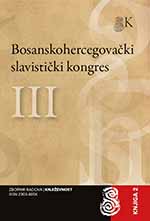Emocijski narativi o traumi silovanja u hrvatskoj književnosti od 19. do 21. stoljeća
Emotional narratives about the trauma of rape in Croatian literature from the 19th to the 21st century
Author(s): Kornelija Kuvač-LevačićSubject(s): Language and Literature Studies, Gender Studies, Studies of Literature, Croatian Literature, Studies in violence and power, Victimology
Published by: Slavistički komitet BiH
Keywords: emotional narrative; emotionology; identity; trauma; rape; recent Croatian literature; August Šenoa; Slavenka Drakulić; Kristijan Novak;
Summary/Abstract: The topic of rape permeates the cultural, identity and ideological aspects of the literary text. Considering that it is a presentation and expression of traumatic physical, psychological and spiritual experience (mostly women, but in 21st century this is not the rule), the emotional narratives that each text has, or the ways in which it constructs them, play an important role. Through several texts of Croatian literature of the 19th, 20th and 21st centuries, constructs of emotional narratives about the trauma of rape will be considered. Their development and relationship to ontem, psychic, societal and ideological figures / text structures will be monitored, with a dominant focus on several main emotions that accompany trauma, regardless of the period in which a particular text is created. Due to the necessity of limiting the scope of this research, the corpus consists of several receptionistly influential texts of recent, contemporary and most recent Croatian literature. These are the novels: Seljačka buna by August Šenoa (19th century, rape as the initiator of the collective revolt), Kao da me nema by Slavenka Drakulić (20th century, rape as a political and war subjugation of the collective) and Črna mati zemla by Kristijan Novak (21st century, the rape of a child as a monstrous reverse of the collective in the novel). The three texts will be comparatively analyzed on the basis of emotional narratives about rape with the aim of revealing a paradigm that answers the questions: which traumatological aspects of rape are represented by individual authors, on which narrative actions the effect of emotional empathy is grounded, where narrative empathy is directed, how the trauma of rape as a cultural trope is incorporated by an individual author into the identity constructs of the individual and the collective of the 19th, 20th or 21st century and what it represents on the compositional, societal, ontemic and ideological level of the literary text.
Journal: Bosanskohercegovački slavistički kongres
- Issue Year: III/2022
- Issue No: 2
- Page Range: 199-220
- Page Count: 22
- Language: Croatian

